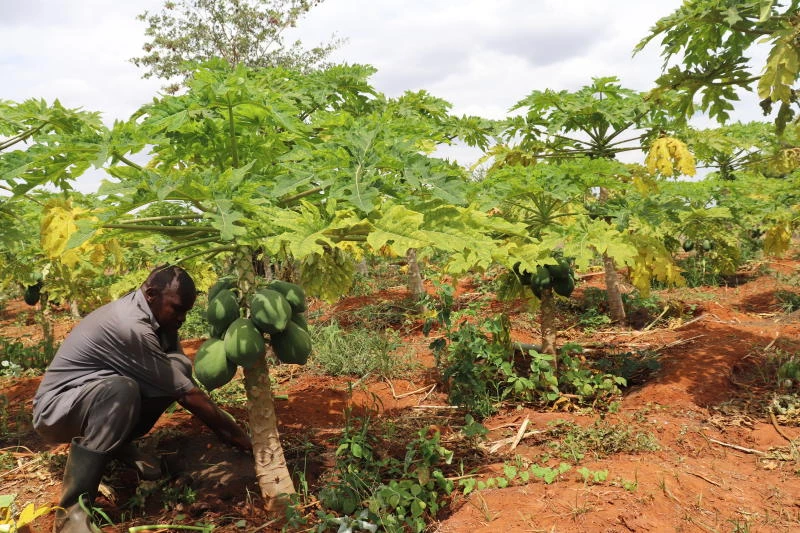In the heart of the semi-arid Ciangera area of Embu County, Kenya, there exists a remarkable transformation—a barren piece of land has been reborn into a thriving oasis of pawpaws, mangoes, and oranges.
This awe-inspiring journey belongs to none other than Robert Muriithi, a dedicated farmer whose relentless hard work and unwavering commitment to his craft have turned adversity into prosperity.
In 2012, Robert Muriithi purchased a 12-acre plot of land in an area where fertile soil is a rarity and water is a precious resource. However, Muriithi’s vision was clear—to make the most of what he had and to create a productive farm against all odds.
One of the keys to his success lies in his adoption of irrigation farming. His farm is situated near the life-giving River Thuci, which serves as a vital water source for hundreds of farmers, including Muriithi.
His journey was made possible through the Green Paradise Community Water project, which provides irrigation water to 750 households in the region.
Under the guidance of the project’s chairman, Nyaga Kidole, and with the support of donated pipes from the Upper Tana Natural Resources Management Project, water from River Thuci is harnessed and channeled downstream to their farms, spanning a distance of 11 kilometers. This innovative approach to irrigation has transformed arid land into fertile ground, enabling crops to flourish.
The centerpiece of Muriithi’s farm is his awe-inspiring pawpaw plantation. Featuring 1,000 pawpaw trees of the vega F1 and red royale varieties, Muriithi has turned this fruit into his cash crop of choice.
In the bountiful seasons, he harvests an astonishing one tonne of pawpaw fruits every day, selling them at Sh50 per kilogram—a testament to the profitability of his endeavor.
Muriithi’s success extends far beyond his farm’s abundant harvests. The income generated from his agricultural enterprise has empowered him to achieve more than he could have ever imagined. He has purchased additional parcels of land, ensuring his legacy continues to grow.
Moreover, he has prioritized education, ensuring that his children have access to opportunities he never had. To complete this picture of success, Muriithi has built a comfortable and secure home for his family.
Muriithi’s journey into farming began nearly three decades ago when he cleared high school. Even during his school days, the passion for farming burned brightly within him.
Armed with a mere Sh1,000 borrowed from a relative, he embarked on his farming odyssey on a small piece of land provided by his parents.
In those early days, he recalls the sheer physical toil of drawing water from a 100-foot well and hauling it with his bare hands to irrigate his crops. Yet, he knew that success required starting somewhere, and his determination was unwavering.
However, Muriithi’s path was not without its challenges. There were times when he watched his tomato crop wither away due to exhaustion from manually ferrying water to his farm.
A benevolent neighbor recognized Muriithi’s tireless work ethic and offered him the use of a more accessible piece of land for farming.
Muriithi’s journey was marked by relentless savings and smart investments. He joined a chama (a savings and investment group) where he saved Sh20,000, which he used to purchase a water pump.
Over the years, he experimented with various crops, including maize, watermelons, capsicum, tomatoes, butternuts, and long chilis. This experimentation provided valuable insights into the crops that were both profitable and sustainable.
Ultimately, he settled on pawpaws, mangoes, and oranges. These fruit trees proved to be ideal choices, as they required minimal inputs and were less susceptible to price fluctuations. The cost of producing an acre of pawpaws, accommodating 600 trees, amounted to approximately Sh100,000.
Each tree takes about seven months to start producing and can yield up to 30 kilograms of pawpaw. Although these trees can potentially last up to four years, the intense sunlight in the region typically limits their productive lifespan to around two years.
In addition to his pawpaw, mango, and orange orchards, Muriithi has diversified his farm with sugarcane and boma rhodes grass, catering to the needs of livestock farmers in the area.
Despite his remarkable achievements, Muriithi has faced formidable challenges. Pests, including mealy bugs and spider mites, have plagued farms throughout the Mt. Kenya region, and Muriithi’s orchard has not been immune to their devastating effects.
Spider mites, which cause yellowing in plants, are a recurring menace even after spraying. Mealy bugs pose a threat by draining the juices from pawpaw fruits.
Furthermore, the specter of water shortages looms, particularly during dry spells.
Surprisingly, this challenge persists even for a farmer situated at the foot of one of the largest rivers in the area. Access to consistent and reliable water remains a critical factor in maintaining and maximizing his farm’s productivity.

